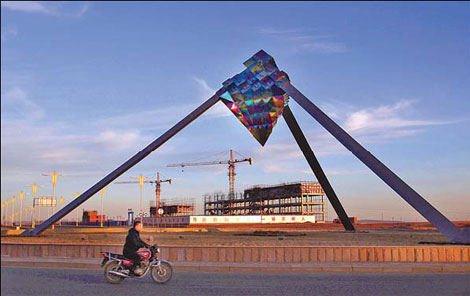New standards for rare earth sector
|
|
|
New buildings under construction are surrounded by a rare earth mine, a processing factory and a steel plant. China's new environmental standards on rare earth mining await government approval. [China Daily] |
A set of new industry standards aimed at reducing pollution and to regulate practices by rare earth mining companies is set to be revealed this year, after obtaining the appropriate approval from the Ministry of Environmental Protection (MEP), said an expert who helped draft the standards.
The new standards, which are expected to pose operational challenges and raise environmental costs, will put rare earth miners under the spotlight, said Huang Xiaowei, vice-director of the National Engineering Research Center for Rare Earth Materials and a professor in Beijing General Research Institute for Non-ferrous Metals.
Under the proposed new standards, the permissible amount of pollutant in a liter of waste water from production should contain 15 milligrams of ammonia nitrogen, an improvement on the current 25 mg, said Huang, who is part of a team tasked to draft the standards.
These also include new regulations on emission quantities of radioactive elements and phosphorus, she said.
"The government will allow two or three years for rare earth companies to upgrade their techniques. If they don't meet the standards, the miners will be banned from the industry," said Huang.
"The new standards, which are scheduled to be released after the Chinese Spring Festival (which falls on Feb 3), will be stringent. This will affect the cost of rare earth production and may raise the prices of Chinese rare earth exports," said Niu Jinglu, deputy secretary-general of the Chinese Society of Rare Earths.
The MEP approved these standards on Dec 30, according to the ministry's website.
China has released guidelines to reform the industry by cracking down on illegal mining practices, encouraging more consolidation and reducing exports, as oversupplies have depleted the country's resources and caused serious damage to the environment.
China is also considering whether to establish an industry association and a governmental unit for the rare earth industry to enfore more regulation over these precious metals.
Rare earths, composed of 17 elements, are used in a number of high-tech processes ranging from wind turbines and hybrid cars to missiles. China has about 30 percent of global rare earths reserves, but produces 97 percent of the world's total supply.
The government said the proposed restrictions are due to environmental concerns, because rare earths are usually found in undeveloped regions and over-exploitation has damaged the local environment.
Chao Ning, section chief of foreign trade with the Ministry of Commerce, said at a conference in Beijing that strategic, environmental and economic considerations mean that the country can't afford to continue shouldering the burden of supplying the world.
Developed countries - such as the United States, which alone holds 15 percent of the world's reserves - depend almost entirely on Chinese supplies.
The US ceased domestic production long ago because importation is more cost effective. Since 2006, China has imposed temporary taxes on rare earth exports and set limits on quotas.
China is speeding up the pace of mergers and acquisitions in the rare earths sector and is encouraging consolidation among State-owned enterprises. Industry sources said the central government wants to reduce 123 rare earth mines across the nation to less than 10, as well as reduce the number of processing firms from the current 73 to 20.
 0
0 







